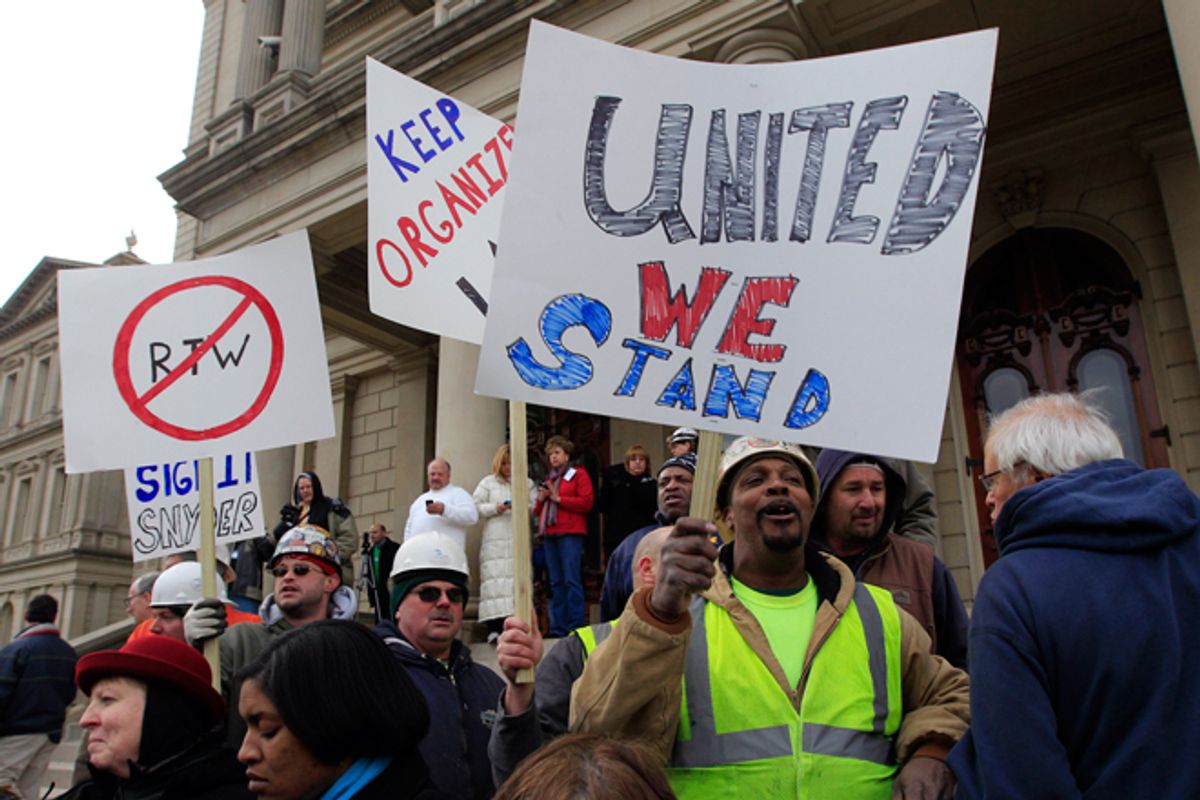Michigan lawmakers gave final approval today to a so-called right-to-work law, which bans unions from charging mandatory dues, arguing that it will be a boon for the state’s economy. “This is to move Michigan forward. It’s about more and better jobs, and it’s about worker choice,” Republican Gov. Rick Snyder told MSNBC this afternoon.
Right-to-work laws are already in place in 22 states, so do they actually create more and better jobs? We asked some experts to find out and the answer is, well, complicated.
Lonnie Stevans, a professor at Hofstra University who used quantitative models to study the issue, is not bullish on the laws. “Although right-to-work states may be more attractive to business, this would not necessarily translate into enhanced economic verve in the right-to-work state if there is little ‘trickle-down’ from business owners to the non-unionized workers," he told Salon.
He added that there is “no significant difference in capital formation or employment rates” between states with right-to-work laws and those without them, and “per-capita personal income and wages are both lower, yet proprietors’ income is higher.”
Sylvia Allegretto, an economist at the Institute for Research on Labor & Employment at the University of California, said right-to-work laws are “just wrongheaded.” The biggest problem in the economy, she said, is not enough job creation and income inequality -- and the laws do nothing to address that.
She said there’s little empirical evidence showing the “employment effect” -- i.e., that companies flock to states with right-to-work laws and hire more people -- and said that if you ask corporations why they chose to relocate somewhere, right-to-work is “way down or not even on the list."
Lawrence Mishel of the liberal Economics Policy Institute wrote in 2001 that working in a right-to-work state results in a 6 to 8 percent reduction in wages. Even controlling for regional cost-of-living differences, the difference is a fairly significant 4 percent penalty.
But Robert Reed, an American labor economist who is now the head of the economics and finance department at the University of Canterbury in New Zealand, said the laws’ effects are mostly positive. “I think the evidence at the aggregate level is pretty convincing that RTW states grow faster.” A much-cited study from Thomas Holmes at the University of Minnesota found economic growth, but not wage growth.
“My study then showed that wages grow faster in RTW states,” Reed said. “That being said, there is no smoking gun” that shows right-to-work laws were the cause, he acknowledged. “Frankly, it’s a little like the old debate on does tobacco cause cancer? For many years there was a clear correlation between smoking and cancer. However, the tobacco industry criticized those studies, saying they did not prove causation.”
Indeed, Michael Hicks, the director of the Center for Business and Economic at Ball State University in Indiana, is used to people drawing different conclusions from the same data. “This is an easy subject to demagogue when looking solely at the data.” He noted that on one hand, states without right-to-work laws laws have higher per-capita incomes and higher unionization rates. But on the other hand, states with the laws have faster-growing economies, and faster-growing incomes. “These facts provide endless grist for politicians, and are difficult for voters to decompose, since clearly higher incomes and faster growth are both desirable.”
Part of the problem is that there's very little data because most passed their laws in the 1940s and 1950s, meaning it's hard to do a before and after comparison.
In the end, right-to-work laws probably don’t have an big impact alone, he said, noting that it's business-friendly policies as a whole, not right-to-work laws alone, that have the big impact. “It is important to note that even if the most optimistic estimates of RTW’s positive benefits are correct (and I think they are not), then they are still a drop in the bucket when compared to other factors (e.g., eighth grade math scores of students in a state),” he said.
One thing that is clear is that Snyder’s frequent invocation of success of the right-to-work law in Indiana is probably exaggerated at best and bunk at worst. But beyond that, it’s hard to draw any universal conclusions.
But the real impact of right-to-work ways may not be economic at all. The real effect, some experts said, will come in the form of worse pensions and benefits deals for public sector workers. That will be helpful to state balance sheets, but is bad for state workers. Voters in some states may consider that a valid reason to pass right-to-work laws, but it’s certainly not the reason Michigan Republicans are giving for their effort.



Shares